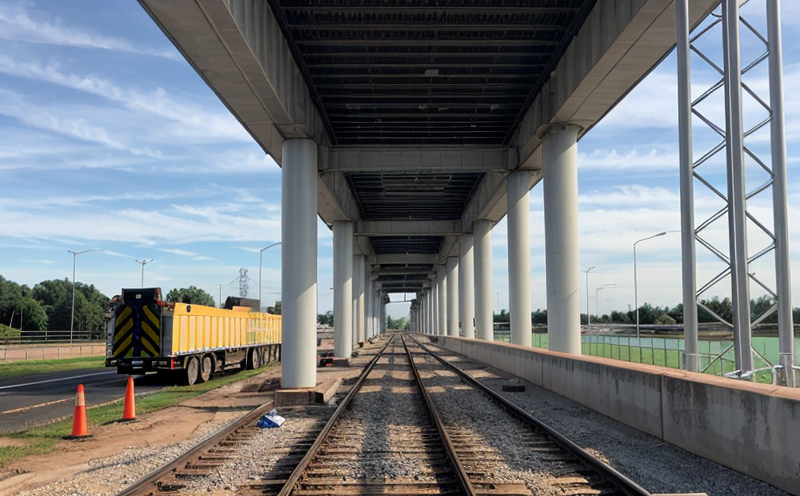ASTM D5044 Geotextile Permeability Testing
The ASTM D5044 standard provides a comprehensive protocol for determining the permeability of geotextiles under specified conditions. This service is essential in ensuring that materials used in infrastructure projects meet design specifications, thus enhancing durability and performance.
Permeability testing assesses how water or other fluids pass through a geotextile membrane. In building and infrastructure applications, this data is critical for selecting appropriate materials to prevent seepage and enhance structural integrity. By measuring permeability, engineers can determine the suitability of geotextiles in various environments, including roadways, landfills, and soil stabilization projects.
The test involves placing a sample of the geotextile between two chambers where water pressure is applied. The rate at which the water passes through the sample is then measured. This measurement is crucial for understanding how effectively the material can control fluid flow in different scenarios. For instance, in landfills, controlling seepage is vital to prevent contamination and ensure compliance with environmental regulations.
Accurate permeability testing ensures that geotextiles are selected based on their ability to withstand specific conditions, such as high water pressure or varying temperatures. This service supports the quality assurance process by providing precise data that can be used in design specifications and material selection processes.
The ASTM D5044 method is widely recognized for its consistency and reliability, making it a preferred choice among engineers and researchers involved in geotextile applications. Compliance with this standard ensures that materials meet international quality benchmarks, thus enhancing trust and credibility within the industry.
To perform ASTM D5044 testing, samples are carefully prepared according to the specified dimensions. The apparatus used includes a permeameter, which consists of two parallel plates separated by a known distance. Water is introduced into one chamber at a controlled pressure while the other remains open to atmosphere. Over time, the amount of water that passes through the sample is measured.
The test parameters are critical for obtaining accurate results. The pressure applied must be consistent with the expected operating conditions in the field. Temperature control is also essential as it affects fluid viscosity and thus permeability. By adhering strictly to these guidelines, laboratories can ensure reliable data that reflects real-world performance.
Scope and Methodology
The scope of ASTM D5044 Geotextile Permeability Testing includes the determination of the resistance of geotextiles to flow of water. This test is performed under controlled conditions, which involve applying a specified water pressure across a sample.
| Parameter | Description |
|---|---|
| Water Pressure | The pressure at which water is applied to the geotextile sample. Typically, this ranges from 10 kPa to 50 kPa. |
| Sample Dimensions | The size and shape of the geotextile sample used for testing. Standard dimensions are specified in the ASTM D5044 standard. |
| Test Duration | The length of time over which permeability measurements are taken. This is usually between 10 to 60 minutes, depending on the desired accuracy. |
The methodology involves positioning the geotextile sample in a permeameter device. Water is then introduced into one chamber at the specified pressure while allowing it to flow through the sample and into the second chamber. The volume of water that passes through the sample during the test period is measured using calibrated containers.
International Acceptance and Recognition
The ASTM D5044 standard has been widely adopted globally due to its stringent requirements and consistent results. Many countries, including the United States, Canada, Australia, and various European nations, use this method for quality assurance in geotextile testing.
Engineers and researchers rely on ASTM D5044 to ensure that materials used in infrastructure projects meet international standards. This standard is particularly important for projects involving environmental protection, such as landfills and erosion control measures. By adhering to these guidelines, construction companies can demonstrate compliance with global best practices.
The widespread acceptance of ASTM D5044 has contributed to the development of a robust testing industry focused on geotextile materials. Laboratories around the world have invested in specialized equipment and trained personnel to provide accurate and reliable permeability tests. This has led to increased trust in the results, which are often referenced in international agreements and contracts.
Compliance with ASTM D5044 is not only a matter of quality assurance but also a legal requirement for many projects. Governments and regulatory bodies frequently reference this standard in procurement documents and project specifications. By ensuring that materials meet these standards, laboratories contribute to the successful implementation of infrastructure projects worldwide.
Competitive Advantage and Market Impact
- Accurate Testing: Compliance with ASTM D5044 ensures consistent results across different testing facilities, giving clients confidence in the reliability of your services.
- Global Recognition: Being a recognized provider of ASTM D5044 testing enhances your reputation among international clients and stakeholders.
- Informed Decision-Making: Providing detailed reports based on this standard allows clients to make informed decisions about material selection for their projects.
- Increased Business Opportunities: A reputation for high-quality testing can open doors to new contracts, both domestically and internationally.
The ASTM D5044 Geotextile Permeability Testing service is not only a technical requirement but also a strategic advantage in the competitive infrastructure market. By offering this service, you position your laboratory as a leader in quality assurance, enhancing your standing among industry stakeholders.
With increasing global demand for sustainable and resilient infrastructure projects, the ability to provide accurate permeability testing under ASTM D5044 standards is crucial. This ensures that materials used meet international standards, thereby contributing to the overall success of construction projects worldwide.





